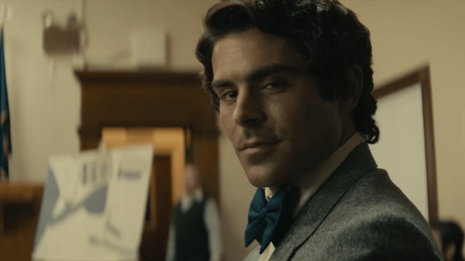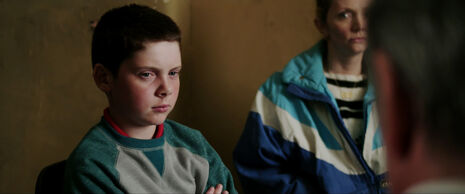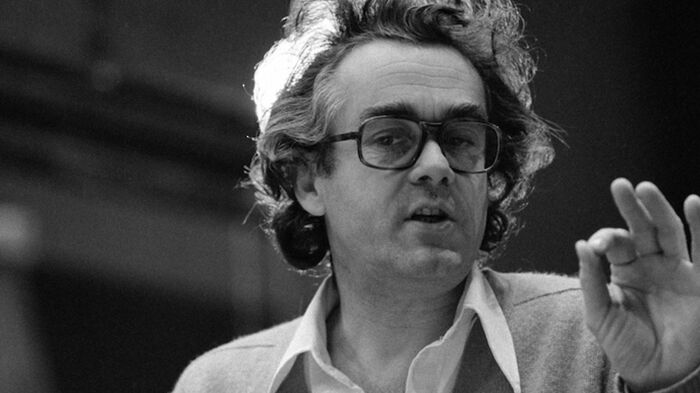The travesty of representing tragedy
Considering an Oscar-nominated short and the upcoming film about Ted Bundy, Tom McIntosh worries that cinema is exploiting acts of evil as entertainment

As long as there has been drama, there has been tragedy. The classical unities of theatre, first contemplated by Aristotle some two thousand years ago, highlight tragedy as the foundation on which a piece of dramatic art is constructed; it drives the narrative, develops character and, most importantly, encourages the audience to feel. Yet when tragedy lays its roots in real-life events, especially those which are still raw for many in our generation, or our parents’ and grandparents’ generations, the emotion conjured by it quickly sours – rather than being poignant, it can often stir up painful feelings, or even feel derisive.
Such is the case with Detainment, Irish film-maker Vincent Lambe’s Oscar-nominated short about the police interrogation of James Bulger’s murderers in 1993. In my hometown of Liverpool, two-year-old James’s senseless and brutal death is still a sore subject. The names of Robert Thompson and Jon Venables, the two then ten-year-olds responsible, are unspeakable for some – poison-tipped reminders of a crime which incensed a nation and generated a landmark debate about how our legal system treats minors. It was thus natural that Lambe’s film would be met with resentment when for many, the wounds caused by Thompson and Venables have not healed, nor indeed will they ever.
No one knows this more than James’s parents, Denise Fergus and Ralph Bulger, who have publicly expressed their disgust at the film and Lambe’s lack of consultation with them before it entered production. Fergus has even called on the Academy to withdraw it from consideration for an Oscar, a plea which seems to have fallen on deaf ears. In an appearance on Good Morning Britain, Lambe defended his “humanisation” of the killers by suggesting that only by understanding them as human beings can we prevent such from crimes happening again. This may or may not be a valid point – I would feel unqualified to give judgement either way – but how can Lambe in good faith sweep aside the feelings of two grieving parents, even in the name of art?

Detainment offers nothing new to the James Bulger case; it traces the steps of previously covered ground with regard to the “condemn less, comprehend more” argument. If anything, it simply serves to capitalise on our ghoulish fascination with death. It transplants the shame and horror of my city from twenty-six years ago and repackages it with a Hollywood gleam, serving it up to the ghoulishly fascinated without considering those still picking up the pieces so many years on.
Further afield, the trailer for the Zac Efron-led Ted Bundy biopic Extremely Wicked, Shockingly Evil, and Vile has prompted ire on social media. In the trailer, the former Disney heartthrob seduces, schmoozes and, crucially, slaughters his way through a series of seemingly enchanted women. American Hustle-esque blues music soundtracks Efron’s Bundy simpering for the camera and slipping out of a window away from the police like the scrappy anti-hero of a black comedy, rather than a prolific murderer of women and children – one who relished in the media attention he received. Bundy’s God complex, indeed, is something acknowledged in the trailer – at one point, he asserts he’s “more popular than Disney World” – so why is it appropriate that we massage his ego in this way, albeit posthumously?
It would be remiss to suggest that the portrayal of Bundy as charismatic and personable is entirely baseless; indeed, this was part of the reason he was so effective as a killer. But this does not negate the fact that the families of his uncountable victims are still alive to mourn for them today. The murders are not some ghost story from a bygone age – this is 1970s America, etched within the memories of a vast proportion of the population. From this preview alone, it would seem director Joe Berlinger’s interpretation of Bundy as a Dexter-lite ladykiller has a tawdry quality.
It aims unabashedly for the millennial audience who popularised My Favourite Murder – a “comedy-crime” podcast, for the uninitiated, which flippantly ends each show with the tagline “Stay sexy, don’t get murdered”. To reinvent such brutal crimes for a swooning modern-day audience feels sordid, and once again ignores the fact that there are real people behind the eye-catching gore. It begs the question, how would America feel about a film that recast the terrorists behind 9/11, for instance, as lovable rogues? Or is it only charming white murderers who are afforded such a portrayal?
It is not my belief that true crime and disaster is untouchable within the remit of drama. ITV’s fantastic series Manhunt, starring Martin Clunes as the detective responsible for capturing Levi Bellfield, brought the focus out of the crime scene and into the office, forgoing gratuitous death scenes for fascinating police procedure. Not only was it well-executed, but it was effective, as more potential victims of Bellfield came forward following its airing. Returning to something with a more local flavour, Jimmy McGovern’s 1996 Hillsborough used fictionalised characters to give a refreshingly honest depiction of what really happened on that fateful day, twenty years before the ninety-six Liverpool fans and their families saw any true justice in a court of law.
Tragedy is not something to be hushed up in art, brushed under the carpet and unspoken of. Nor, however, is it the job of the artist to glorify those responsible, particularly when there are some among us who are still struggling to move on.
 Features / Should I stay or should I go? Cambridge students and alumni reflect on how their memories stay with them15 December 2025
Features / Should I stay or should I go? Cambridge students and alumni reflect on how their memories stay with them15 December 2025 News / Dons warn PM about Vet School closure16 December 2025
News / Dons warn PM about Vet School closure16 December 2025 News / Cambridge study finds students learn better with notes than AI13 December 2025
News / Cambridge study finds students learn better with notes than AI13 December 2025 News / SU reluctantly registers controversial women’s soc18 December 2025
News / SU reluctantly registers controversial women’s soc18 December 2025 News / News In Brief: Michaelmas marriages, monogamous mammals, and messaging manipulation15 December 2025
News / News In Brief: Michaelmas marriages, monogamous mammals, and messaging manipulation15 December 2025









